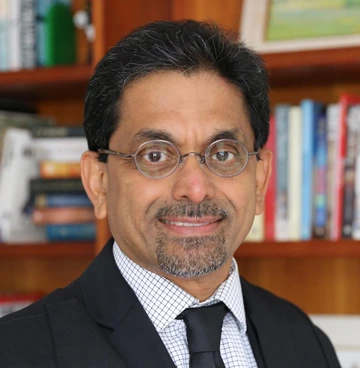When

Thursday, September 25, 2025, at 4:00 p.m.
Harsha K. Chelliah
Professor of Mechanical and Aerospace Engineering
Department of Mechanical and Aerospace Engineering
University of Virginia
"Challenges in Flame Stabilization and Gas-Material Interactions in Hypersonic Propulsion Systems"
AME Lecture Hall, Room S202
Zoom link

Abstract: Over the last several decades, research on hypersonic propulsion has seen several cycles of resurgent interest, typically at fifteen- to twenty-year intervals. We are currently in the midst of another peak cycle with worldwide interest in hypersonic propulsion. The fundamental challenges remain nearly the same, i.e. inlet design and mass capture, shockwave-boundary layer interactions, flow distortion and fuel-air mixing, flame holding over recirculation regions, turbulence-chemistry interactions, thermal management with endothermic fuels, heat pipes with molten salts, etc. Advances in synthesis of high-and ultra-temperature materials and additive printing capabilities are expected to rapidly accelerate the process of finding engineering solutions to several of the above challenges.
In this presentation, recent work at the University of Virginia on two related topics will be discussed. First, flame stabilization studies under the interesting dual-mode combustion conditions, corresponding to a flight Mach number of about five, will be discussed. A host of advanced diagnostic methods (PIV, OH PLIF, CARS) and computational methods used with partner institutions to better understand the complex flow field will be described. In the second part of the presentation, recent work on gas-ceramic materials interactions will be presented with some implications to high-temperature ceramic composite materials currently being considered for gas turbine engines and hypersonic vehicles, especially for re-entry conditions.
Bio: Harsha Chelliah is a professor of mechanical and aerospace engineering at the University of Virginia (UVa). Currently, he is also serving as the program director of the Combustion and Fire Systems at the National Science Foundation. Prior to joining UVa, he received his PhD in mechanical and aerospace engineering from Princeton University in 1988. His research is focused on fundamental interactions between finite-rate kinetics and fluid flow using both experimental and modeling approaches. He was the director of the Commonwealth Center for Aerospace Propulsion Systems (from 2011-2014), established by the Commonwealth of Virginia and Rolls-Royce. In addition, he also served as director of Graduate Studies in Mechanical and Aerospace Engineering (from 2011-2015). He is a Fellow of ASME, a Fellow of the Combustion Institute, an Associate Fellow of AIAA, 2016 Thomas Jefferson Fellow at Downing College, Cambridge University and Visiting Fellow at Peterhouse College, Cambridge University.
